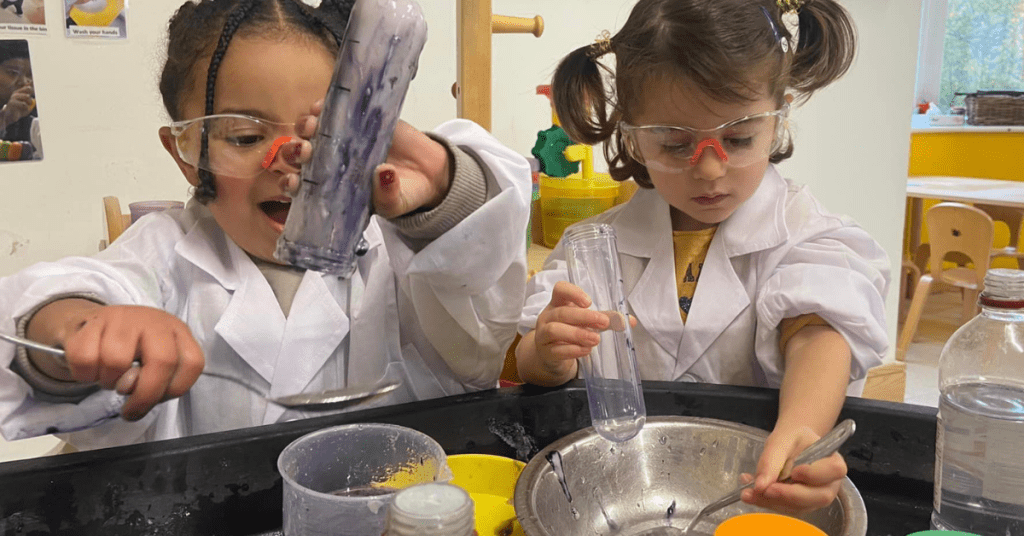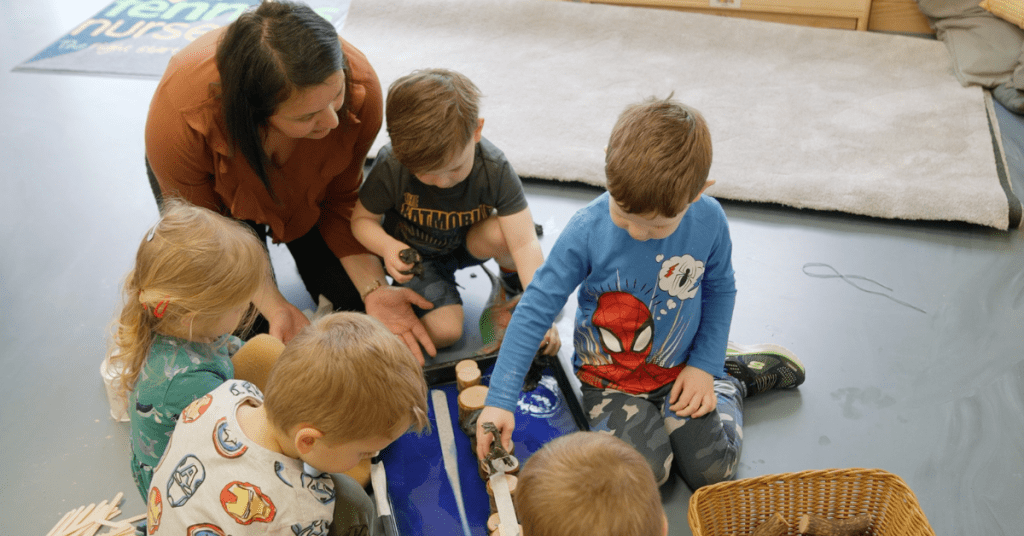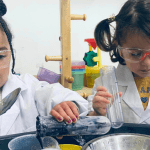



In recent years, there has been a growing recognition of the importance of introducing children to STEM (Science, Technology, Engineering, and Mathematics) activities during their early years. Here we explore the significance of engaging young children in STEM experiences and how it contributes to their holistic development across the seven areas outlined in the Early Years Foundation Stage (EYFS). By drawing upon theoretical frameworks, empirical research, and insights from psychologists, we demonstrate the benefits of STEM activities during the formative years of a child’s life.
The cognitive development theories of Jean Piaget, Lev Vygotsky, and Jerome Bruner provide a solid theoretical foundation for understanding the value of early STEM exposure. Piaget’s theory emphasises the importance of hands-on exploration and interaction with the environment in constructing knowledge. According to Piaget, children actively construct their understanding of the world through sensory experiences, which are foundational to scientific inquiry.


Vygotsky’s sociocultural theory states that children’s cognitive development is shaped by social interactions and cultural tools. He introduced the concept of the “zone of proximal development,” where learning occurs most effectively when children are guided by more knowledgeable others. In the context of STEM activities, adult support, effective interactions and scaffolding can facilitate children’s problem-solving skills and understanding of new and complex concepts.
Jerome Bruner’s theory of cognitive development emphasises the role of scaffolding in learning. He suggests that children learn best through active participation in meaningful activities that are appropriately challenging. STEM activities, such as building structures or conducting simple experiments, provide optimal learning experiences that align with Bruner’s theory by engaging children in hands-on exploration and problem-solving.
Engaging in STEM activities from an early age offers numerous psychological benefits. Research by psychologist Alison Gopnik suggests that young children are natural scientists, constantly forming hypotheses and testing theories about the world around them. Participating in STEM activities nurtures this innate curiosity, encouraging critical thinking, problem-solving skills, and a deeper understanding of cause-and-effect relationships.


Exposure to STEM activities during early childhood can enhance children’s executive function skills, such as attention control, cognitive flexibility, and working memory. These skills are essential for academic success. Additionally, engaging in STEM activities promotes persistence and resilience in the face of challenges, which are vital for developing a growth mindset.
STEM activities have a profound impact on all seven areas of development identified in the EYFS:


Empirical research consistently supports the benefits of early STEM exposure on children’s cognitive development. The Department for Education (DfE) study in the UK investigated the impact of early STEM education on children’s cognitive development. Through an analysis of children engaged in structured STEM activities in early childhood settings, the study revealed significant positive effects. Children exposed to STEM experiences demonstrated enhanced problem-solving skills, displaying improved critical thinking abilities. Additionally, these children exhibited measurable advancements in mathematical reasoning, suggesting a positive influence on numeracy development. The study found that early engagement in STEM activities increased children’s interest and enthusiasm for STEM subjects as they progressed in their education.
Neuroscientific studies highlight the impact of early experiences on brain development. Engaging in STEM activities stimulates neural pathways associated with critical thinking and spatial reasoning. Research also suggests that exposure to STEM activities during the early years can mitigate the gender gap in STEM participation by fostering interest and confidence in girls.
Exposing children to STEM activities from birth to five years old is beneficial for their holistic development. Theoretical perspectives from Piaget, Vygotsky, and Bruner underscore the cognitive benefits of early STEM experiences, while empirical research provides robust evidence of its positive impact on children’s cognitive, social, and emotional development. By incorporating STEM activities into daily routines and educational settings, parents and educators can nurture children’s natural curiosity, promote foundational skills, and inspire the next generation of thinkers, innovators, and problem solvers.


Director of Early Years












View All
This website uses cookies so that we can provide you with the best user experience possible. Cookie information is stored in your browser and performs functions such as recognising you when you return to our website and helping our team to understand which sections of the website you find most interesting and useful.
You can read out full privacy policy here
Strictly Necessary Cookie should be enabled at all times so that we can save your preferences for cookie settings.
If you disable this cookie, we will not be able to save your preferences. This means that every time you visit this website you will need to enable or disable cookies again.